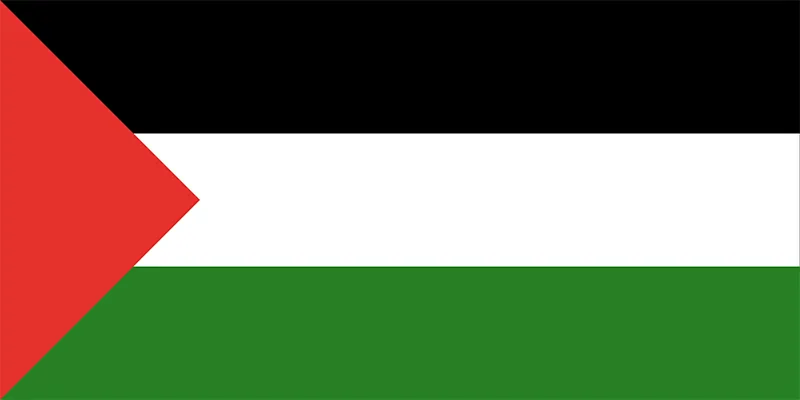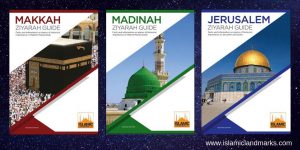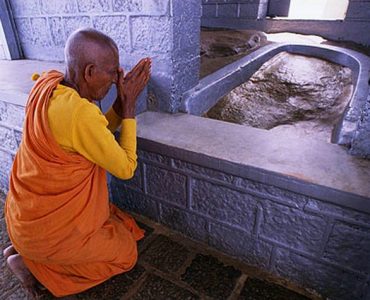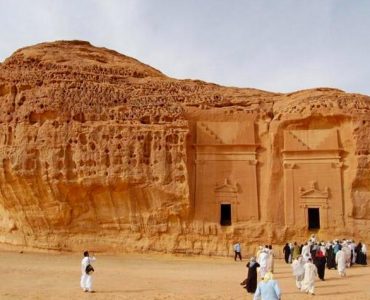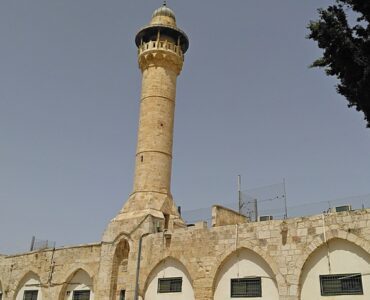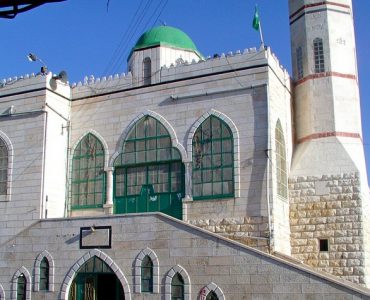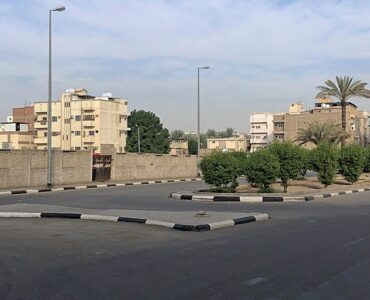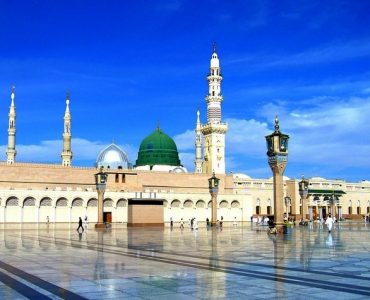Referring to the direction Muslims face while offering prayer (Salah), the Qibla is the focal point of Salah that creates a tangible connection with the Almighty. Pronounced “QIB-LAH,” the Arabic word means to confront, encounter, or face.
With unwavering conviction, Muslims – five times a day – turn their faces, heart, and soul towards the Holy Kaaba to perform prayer. The Qibla doesn’t only signify individual devotion but also serves as a unifying symbol, fostering a sense of unity and identity among Muslims all around the world. Keep reading the article to learn why do Muslims pray towards the Mecca.
What Is the Kaaba?
Situated in the heart of Makkah, surrounded by believers from every corner of the Earth, stands the Holy Kaaba, a cube-shaped inspiring monument that embodies centuries of reverence and devotion. Believed to be the House of Allah SWT, the Holy Kaaba is a sanctuary of tranquillity and the destination of pilgrimage (Hajj and Umrah).
Muslims globally face the Holy Kaaba when they perform Salah. It is important to remember that Muslims pray to face the Kaaba and not to it. The Holy Kaaba was initially constructed by Prophet Adam (AS), then by Prophet Ibrahim (AS) and Prophet Ismail (AS) and lastly by Prophet Muhammad (PBUH).
“Lo! The first Sanctuary appointed for mankind was that at Mecca [i.e. Makkah], a blessed place, a guidance to the peoples; Wherein are plain memorials (of Allah’s guidance); the place where Abraham stood up to pray; and whosoever entereth it is safe.
And pilgrimage (Hajj or Umrah) to the House is a duty unto Allah for mankind, for him who can find a way thither. As for him who disbelieves, (let him know that) lo! Allah is Independent of (all) creatures.” [Holy Quran, Al Imran, 3:96-97]
Why Do Muslims Touch the Kaaba?
Even though there is no instruction by the Holy Prophet (PBUH) to do so, touching the Holy Kaaba instils within Muslims a profound sense of closeness to Allah SWT. However, according to Islamic scholars, touching any part of the Holy Kaaba with the intention of getting rewards aside from the Black Stone and Yemini Corner is considered Bid’ah.
Ibn Abbas (RA) narrated, “And I saw the Prophet (peace and blessings of Allah be upon him) touching the Yemeni Corner and the Black Stone.”
Why Do Muslims Face Towards the Qibla When Praying?
The Qibla carries profound significance in the lives of Muslims worldwide. Irrespective of their whereabouts, Muslims turn towards the Qiblah, the direction of the Holy Kaaba in Mecca, while offering obligatory prayers.
In the early years of prophethood and after migration to Madinah, Prophet Muhammad (PBUH) received a revelation instructing him to change the Qiblah from Masjid al-Aqsa to the Holy Kaaba. Prophet Muhammad (PBUH) said, “The best direction to face is towards the Kaaba. So face it when you pray.” (Sunan Abi Dawud)
In another instance, it was reported that “Prophet Muhammad (PBUH) used to offer his prayers towards the Kaaba, and whenever he wanted to pray facing towards other than the Kaaba, he would turn his upper body towards it.” (Sahih Bukhari)
Constructed by Prophet Ibrahim (AS) and Prophet Ismael (AS), the Holy Kaaba is believed to be the centre of monotheism and the most sacred site in the world. Thus, all the mosques are built facing the Qibla, and all worshippers stand in the same direction while performing Salah.
The Qibla is represented by an ornamental indication (Mihrab), and the Imam stands in front of it to ensure that all worshippers are oriented accordingly. Having a Qiblah also helps Muslims focus amidst Salah and reminds them they are worshippers of Allah Subhanahu and to Him shall they return.
Do Muslims Have to Face Mecca When Praying?
Yes, it is compulsory for Muslims to face the Holy Kaaba in Mecca, Saudi Arabia, during supplication, as failing to do so will invalidate the prayer (Salah). The Messenger (PBUH) of Allah SWT instructed the Muslim community, “When you pray, do not face towards the east or the west, but face towards the direction of the Kaaba.” (Sahih Bukhari)
Al-Bara bin Azib reported, “When the Prophet (PBUH) came to Medina, he stayed first with his maternal uncles from Ansar. He offered his prayers facing Baitul-Maqdis (Jerusalem) for sixteen or seventeen months, but he wished that he could pray facing the Kaaba (in Mecca). The first prayer which he offered facing the Kaaba was the ‘Asr prayer in the company of some other people.
Then one of those who had offered that prayer with him came out and passed by some people in a mosque who were bowing during their prayers (facing Jerusalem). He addressed them, ‘By Allah, I testify that I have prayed with Allah’s Apostle facing Mecca (Kaaba).’ Hearing that, those people changed their direction towards the Kaaba immediately.
Jews and the People of the Scriptures used to be pleased to see the Prophet (PBUH) facing Jerusalem in prayers, but when he changed his direction towards the Kaaba, during the prayers, they disapproved of it.” (Sahih Bukhari; Book 2, Hadith 39)
Why Do Muslims Pray 5 Times a Day?
In order to live a rightful life, Muslims are obligated to follow the teaching of the Holy Quran and the Sunnah of Prophet Muhammad (SAW). According to Islamic history, during Miraj (Night Ascension – The Journey to the Seven Skies), Allah SWT commanded Prophet Muhammad (PBUH) to inform the Muslims that they must pray Salah.
Initially, Muslims were directed to pray 50 times a day. However, on Prophet Muhammad’s (PBUH) request, Allah SWT reduced the number of obligatory prayers to five times a day. The Muslim prayers include Fajr, Zuhr, Asr, Maghrib, and Isha.
Stating the significance of praying 5 times a day, Prophet Muhammad (PBUH) said, “If there was a river at your door and you took a bath in it five times a day, would you notice any dirt on you? That is the parable of the five prayers by which Allah removes sins from one’s soul.” (Ibn Babawayh)
Thus, if one wants to live a good life, praying five times a day is the best way to have a peaceful and blessed life in this world and hereafter.
Verses from the Quran
Allah SWT in Surah Al-Baqarah in the Holy Qu’ran says:
“To Allah belongs the East and the West. Wherever you turn, there is the presence of Allah. For Allah is all-Pervading, all-Knowing.” [Holy Quran 2:115]
“The foolish among the people will say, ‘What has turned them away from the Qiblah they were following?’ Say, ‘To Allah belong the East and the West. He guides whomever He wishes to a straight path.” [Holy Quran 2:142]
“And [mention] when We made the House a place of return for the people and a place of safety. And take, [O believers], from the standing place of Abraham a place of prayer. And We charged Abraham and Ishmael, [saying], ‘Purify My House for those who perform Tawaf and those who are staying [there] for worship and those who bow and prostrate [in prayer].'” [Holy Quran 2:125]
“And from wherever you come out, turn your face toward al-Masjid al-Haram. And wherever you [believers] may be, turn your faces toward it so that the people will not have any argument against you, except those of them who do wrong; so fear them not but fear Me. And [it is] so I may complete My favour upon you and that you may be guided.” [Holy Quran 2:150]
Know that every word in the Holy Quran is chosen by Allah SWT Himself, and the above-mentioned verses clearly state that Muslims should face the Qiblah (Holy Kaaba) while performing congregational and daily prayers (Salah) five times a day.
How Do Muslims Know They Are Facing Mecca?
While there is a common misconception that Qiblah is always in the East, it changes as you move around the world. For example, the Qiblah in South Africa is in the north-northeast; in Japan, it is in the west-southwest, and in the UK, it is in the east-southeast.
Allah SWT in the Holy Quran says, “For every nation there is a direction to which they face (in their prayers). So hasten towards all that is good. Wheresoever you may be, God will bring you together (on the Day of Resurrection).
Truly, God is able to do all things. And from wheresoever you start forth (for prayers), turn your face in the direction of Al-Masjid-al-Haram (at Mecca); that is indeed the truth from your Lord. And God is not unaware of what you do.” [Holy Qu’ran 2:148-149]
Facing the Holy Kaaba is essential for Muslims in order to offer Namaz in the right way. Use the below-mentioned ways to find the Qiblah from your location:
- Sun: Rising from the East and setting in the West, the sun has been used to determine the direction of Qiblah since the beginning of Islam. All you need to know is the direction of Makkah in relation to your current location, and you can use the sun’s positioning to find the Qiblah.
- Compass: Using the compass is the simplest way to determine cardinal directions. If you know the direction of Makkah from your location, you can use it to locate the Qiblah accurately.
- Sundial: Find a stick or vertical object about 1 metre (3 feet) in height and use it to mark the centre point and draw a circle around it. As time passes, you will see that the stick’s shadow gets shorter and then will start getting longer. Note the point where the circle meets the shadow and draw a straight line. Mark the first side west and the other East, north, and south accordingly. You can then use the sundial to locate the Qiblah.
- Technology and Applications: The easiest way for Muslims to find Kaaba’s direction is via mobile applications. These applications use the smartphone’s built-in compass and GPS to point the correct Qiblah direction.
Summary – Why Do Muslims Pray Towards Mecca?
Known as the House of Allah SWT, Muslims face the Holy Kaaba while praying (performing Salah) because the Almighty commands it, and Prophet Muhammad (PBUH) instructs Muslims to do the same.
In addition to being the site for the pilgrimage (Hajj and Umrah), the Holy Kaaba is believed to be at the centre of the world, physically and spiritually. It also represents unity and showcases that all Muslims are one in the eyes of Allah SWT.
During his lifetime, the Messenger (PBUH) of Allah SWT guided the Muslims to turn towards Mecca and face the Holy Kaaba when praying, and since then, the Muslim community has been following the Sunnah. Therefore, no matter where they are in the world, Muslims always turn toward the Holy Kaaba while offering Salah







